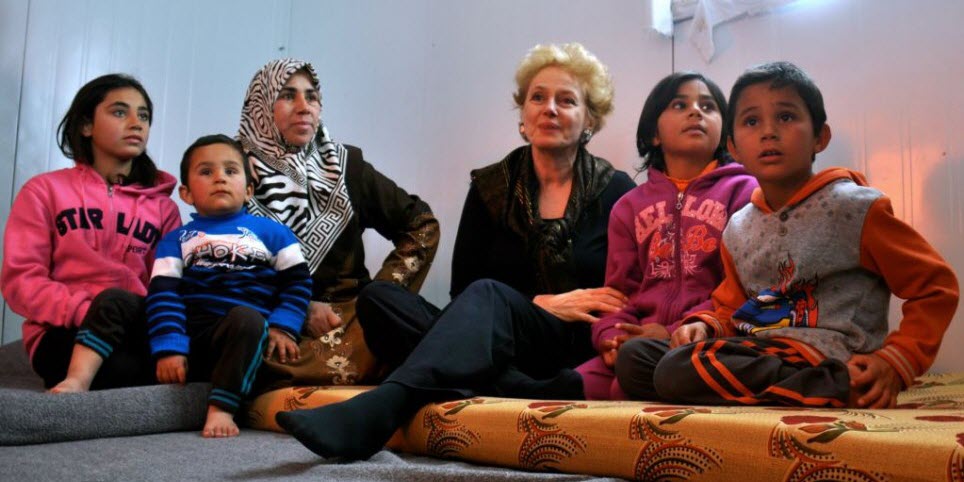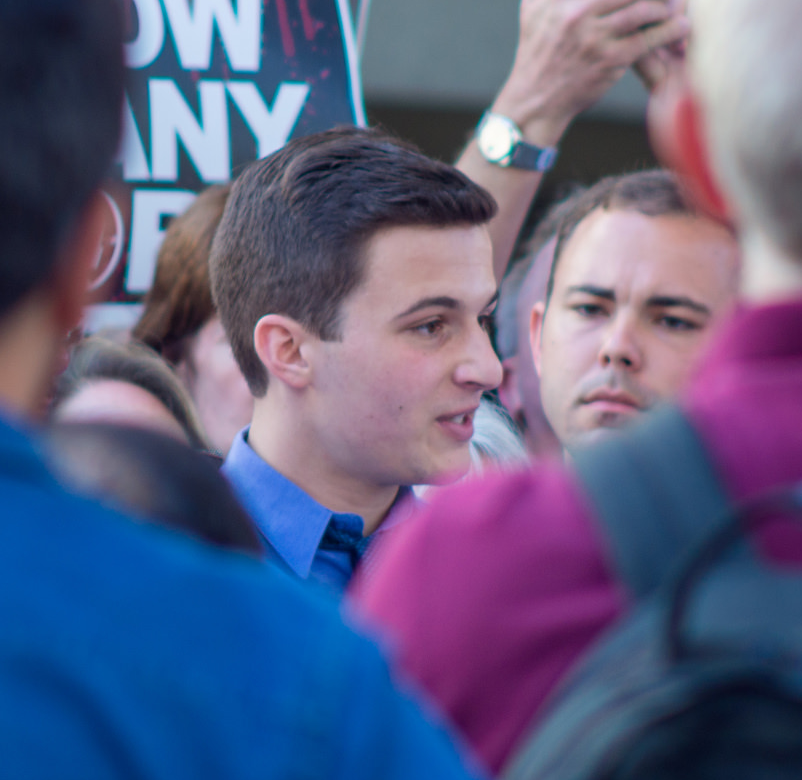Your Daily Phil: RespectAbility gets key boost from venture philanthropy + Inside the Library of Congress’s Hebrew collection
Good Thursday morning!
Today is Veterans Day in the U.S., and Remembrance Day in the U.K. and Commonwealth countries. Last Shabbat, Cantor David Frommer, an Army major who was the first cantor to serve as a military chaplain, spoke at New York City’s Central Synagogue about the Jewish call to service.
Day schools that require masking by faculty and students are starting to talk about when, and under what circumstances, to remove the mandate now that the COVID-19 vaccination is approved for children ages 5 to 11, Paul Bernstein, CEO of the Prizmah day school network, told eJewishPhilanthropy.
Prizmah is seeing a common practice of encouraging vaccination in line with official guidance, while some schools are mandating it, and others are staying officially neutral, Bernstein said.
INVESTING IN INCLUSION
Jewish Venture Philanthropy Fund gives a key boost to RespectAbility


Matan Koch
After nearly a decade advocating for individuals with disabilities, RespectAbility, with a grant from the Jewish Venture Philanthropy Fund (JVPF), is positioned to expand to become a provider of job training. The $25,000 grant will be used to help fund the organization’s National Leadership & Apprenticeship Program, which has been designated by California as a possible state-funded job placement program, Matan Koch, RespectAbility’s vice president for workforce, leadership and faith programs, told eJewishPhilanthropy’s Helen Chernikoff.
Heading west: “To the extent that we have a geographic location, it’s California,” said Koch, whose Los Angeles apartment serves as the organization’s only co-working space. “California is our laboratory.” The apprenticeship program consists of 18 fellows, funded by the Fox Family Foundation, the Kessler Foundation, the MacArthur Foundation, Harry and Jeanette Weinberg Foundation and the Mentor Network, in addition to the JVPF, whose grant will help fund the final three fellows in the pilot cohort, said Jennifer Laszlo Mizrahi, co-founder and president of RespectAbility. The budget for the program, which provides a paid, six-month apprenticeship for each fellow in addition to job-placement support, is about $875,000. More fundraising is necessary, but JVPF’s grant provides a “missing puzzle piece,” Mizrahi said.
Learning and earning: While most of the apprenticeships will be with secular organizations, JVPF’s will train the three participants as fundraisers who will ultimately work for Jewish organizations. They will do their training at RespectAbility, which will also help the organization by increasing the amount of funding it can seek. “It’s a great opportunity to train them and also add capacity to our development department,” Koch said. “They will all work on letters of intent [initial grant pitches]. That’s a volume we could never think about with our current staff.” The grant comes as the field of Jewish disability inclusion searches for a new center of gravity after the announcement in September 2020 that the longtime leader, the Ruderman Family Foundation, would be seeking a new signature issue.
Diverse revenue sources: When Mizrahi helped found RespectAbility in 2013 (she also is a co-founder of The Israel Project, which shuttered its doors in 2019), it was based in Maryland, where she lives, because of its proximity to the federal government and policymakers, Koch said. But over the last five years, the organization’s focus has shifted to California as it began advising Hollywood entertainment studios on stigma reduction. RespectAbility charges for this service, which has enabled it to diversify its revenue instead of relying solely on philanthropy. In 2018, RespectAbility received a three-year, non-renewable, $300,000 grant from the Jewish Community Foundation of Los Angeles to support its local operations. During the pandemic, the group closed its Maryland space and doubled its staff — which now numbers about 30, most of whom live in Los Angeles.
INSIDE THE STACKS
An inside look at the Library of Congress’s Hebrew treasures


Hilary Eldridge for Jewish Insider
Before the pandemic, visitors to the Library of Congress’s ornate Jefferson Building could pop into a reading room and ask to see almost anything in the Library’s collection. While tours have recently resumed, visitors can no longer show up at a reference desk unannounced, asking to see archival treasures. But in an interview last week in a sun-filled, empty reading room, Hebraic specialist Ann Brener and senior reference librarian Sharon Horowitz showed Jewish Insider’s Gabby Deutch some of the Hebraic section’s most important books, including some of the oldest printed Hebrew books to be found anywhere in the world.
Worldly outlook: “If you’re going to be a country of great scholars, you can’t really be parochial in your outlook, and the Library of Congress is now the largest library in the world, with all languages and all subjects,” Brener said. The section is known for its Hebrew and Yiddish books, although it also has books in related languages such as Ladino, Aramaic, Coptic and Amharic. “You’re asking why Hebrew, but the point is, why not?”
Wandering bookseller: The Hebraic section was established in 1912 during a period of international expansion for the institution. Financier and philanthropist Jacob H. Schiff, a German Jewish immigrant to the U.S., donated nearly 10,000 books and pamphlets to the Library. The items had been collected by a prominent bookseller named Ephraim Deinard. “He went wandering into the marketplaces of Iraq. He went to people’s basements. That’s how you collected manuscripts and books in those old days. It’s all different now,” explained Brener.
Common story: Brener held up a 16th-century book, a large volume and the first book printed in the Ottoman Empire in Hebrew. Printed in Safed, this was a commentary on the Book of Esther, which is read every year on Purim. Brener offered a theory on the book’s topic: Jews in Safed had “fled Spain. They had been forced to flee or forced to become Catholics, or to pretend that they were Catholics when they were really Jews. And I think they felt a deep connection to this Biblical story because it is really the story of Esther, and she was like them. She was forced to hide her Judaism. She had to pretend to be something else.”
PHILANTHROPIC CHRONICLES
Philanthropic lessons from an epic Syrian relief effort


Courtesy
“Writing a book means sharing something that one has with the world,” writes Andrés Spokoiny, president and CEO of Jewish Funders Network (JFN), in an opinion piece for eJewishPhilanthropy on the new book, Thou Shalt Not Stand Idly By, written by former JFN board chair Georgette Bennett.?
The story: “Set against the backdrop of the Syrian civil war, the book recounts the efforts of Georgette and others to alleviate the suffering of millions during the worst humanitarian catastrophe of the last decades. The story is riveting; in order to assist – and save – those civilians displaced, injured and broken by the war, Georgette forged seemingly impossible coalitions that cut across religions and across national and ethnic boundaries. Jews, Muslims and Christians cooperated and, years before the Abraham Accords were signed, Syrians and Israelis worked hand in hand.”
Lessons learned: “The story is fascinating and at moments, it looks more like a cloak-and-dagger thriller than a book about social activism. I, however, couldn’t help reading it through a philanthropic lens. Because one can distill valuable, even unique philanthropic lessons from Georgette’s Syrian adventures. Those lessons are not unique to a civil war or a natural disaster but can be applied to any philanthropic field.”
Philanthropic chronicles: “I think there’s a philanthropic lesson in the book itself. Many philanthropic endeavors are unknown beyond a small circle of folks ‘in the know.’ Funders usually ‘reinvent the wheel’ or stumble upon minefields already trod by others. Sharing the story helps guide future initiatives, but, in the broader sense, professionalizes the philanthropic field. It contributes to creating a body of knowledge and a repository of past experiences that help prevent future mistakes.”
Worthy Reads
Comeback Kid: The New York Public Library raised $5.8 million on Monday — more than twice what it had expected — at an annual gala that’s a bellwether for both the institution and the city, reports Amanda L. Gordon in Bloomberg. The participation of Steve and Christine Schwarzman, the event’s executive co-chairs, signaled to Boaz Weinstein, Chimamanda Ngozi Adichie and other leading lights of finance and literature that they could enjoy the evening, secure in the sense that New York hasn’t lost its luster. “I feel wrapped in the nurturing of erudition,” Tina Brown said, citing conversations she’d had with David Remnick and Henry Louis Gates. [Bloomberg]
New Vehicles: Skyrocketing elite wealth is increasingly fueling mammoth philanthropic efforts from MacKenzie Scott, Michael Bloomberg and other “apex donors” — but those initiatives could be threatened by a correction in the stock market, which has been rising in value since 2008, except for a small decline in the beginning of the pandemic, points out Philip Rojc in Inside Philanthropy. Charitable endeavors funded not by a foundation, but by LLCs, donor-advised funds and impact investing initiatives that depend on a particular company’s stock price are especially vulnerable. “If current trends hold, the giving power of many of the coming era’s top philanthropists may be tied to the value of their companies in a way that’s less true with the traditional private foundation,” Rojc concludes. “That means the era of apex donor philanthropy will be less stable and predictable.” [InsidePhilanthropy]
Listen Down: In Forbes, Jack Kelley cites a new global survey from NTT, a global technology company, to suggest that corporate leaders take steps to better understand why most managers are more satisfied with new working norms than most employees. While managers tend to believe that employees want to work from home, in fact, employee opinion is split on that question, and two-thirds of employees are worried about whether they can successfully do their job remotely. “Currently, the narrative is all about remote working, but the reality of employees’ needs is much more complicated, and any failure to accurately assess and respond to that fact presents a serious risk to organizations,” said Alex Bennett, NTT senior vice president. [Forbes]
Community Comms
Lead. Apply for the 2022 cohort of the Certificate in Jewish Leadership, presented by Spertus Institute in partnership with Northwestern University.
Be featured: Email us to inform the eJP readership of your upcoming event, job opening, or other communication.
Word on the Street
The Cohen Center for Modern Jewish Studies released the 2020 Greater MetroWest NJ Jewish Community Study… New York Gov. Kathy Hochul emphasized her administration’s commitment to combating antisemitism and deepening ties with Israel during her first public address to the Jewish community, hosted virtually by the Jewish Community Relations Council of New York… According to a new report from Candid and the Center for Disaster Philanthropy, global corporate, individual, private, public and multilateral funding in response to major disasters and humanitarian crises declined significantly in 2019, from $76 billion in 2018 to nearly $30 billion… Former New York City Mayor Michael Bloomberg will spend $120 million in an effort to reduce the number of deaths from drug overdoses; the pledge more than doubles the $50 million commitment he made toward the same goal in 2018… The Bill & Melinda Gates Foundation announced an initial $50 million commitment in support of a 10-year initiative to support science and innovation in low- and middle-income countries… Syracuse University received a $30 million gift from alumnus and life trustee Daniel D’Aniello and his wife, Gayle, in support of the Institute for Veterans and Military Families… Designer Susan Alexandra opened her first retail store on New York City’s historic Orchard Street on the Lower East Side, where Jewish-owned textile businesses once thrived…
Pic of the Day


Shoah Wall of Names
The Shoah Wall of Names memorial, Austria’s first public Holocaust memorial, located in Ostarrichi Park in the center of Vienna, was unveiled on Tuesday.
Birthdays


Barry Stock via WikiMedia Commons
Survivor of the Marjory Stoneman Douglas High School shooting and an advocate against gun violence, Cameron Kasky…
Businessman and former diplomat, he is the father of Secretary of State Tony Blinken, Donald Mayer Blinken… Retired psychiatric nurse in Surprise, Ariz., Shula Kantor… Attorney in Los Angeles, Gerald I. Neiter… Retired sports broadcaster, Warner Wolf… Former Democratic U.S. senator from California, Barbara Levy Boxer… Author, best known for her 1993 autobiographical memoir Girl, Interrupted, Susanna Kaysen… Television personality, Marc Summers… Founder of Sierra Nevada Brewing Company, Ken Grossman… Founder and president of DC-based Plurus Strategies, David Leiter… President at American Built-in Closets in South Florida, Perry Birman… Aish HaTorah teacher in Los Angeles, author and co-founder of a gourmet kosher cooking website, Emuna Braverman… Talk show host and president of Talkline Communications, Zev Brenner… Founder of NYC-based alternative investment firm Portage Partners, Michael Leffell… Professor of philosophy at the University of Wisconsin-Madison, Steven M. Nadler… Senior fellow at Brookings, CNN legal analyst and former ambassador to the Czech Republic, Norman Eisen… Russian-born billionaire, entrepreneur, venture capitalist and physicist, Yuri Milner… Founder and executive director of Los Angeles-based IKAR, Melissa Balaban… Israel’s commissioner of police, Kobi Shabtai… Emmy Award- and People’s Choice Award-winning television producer, Jason Nidorf “Max” Mutchnick… Member of the Knesset for the Likud party, Orly Levy-Abekasis… Tel Aviv-born actor and screenwriter, Eyal Podell… Defender for the LA Galaxy in Major League Soccer, Daniel Steres… Associate consultant at Boston Consulting Group, Shelly Tsirulik…
Email Editor@eJewishPhilanthropy.com to have your birthday included.TKTKTK








